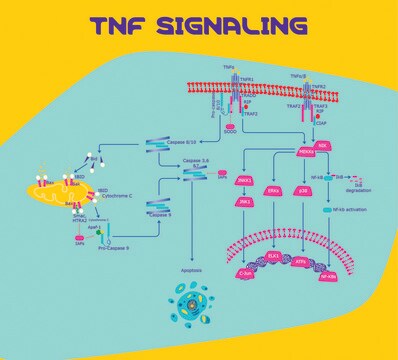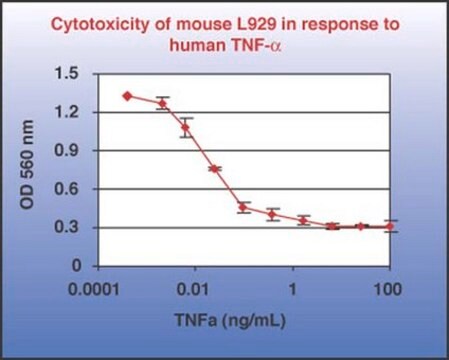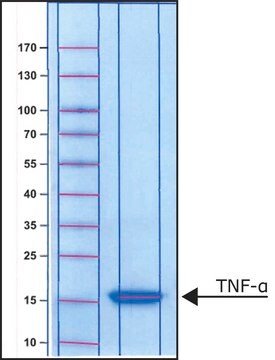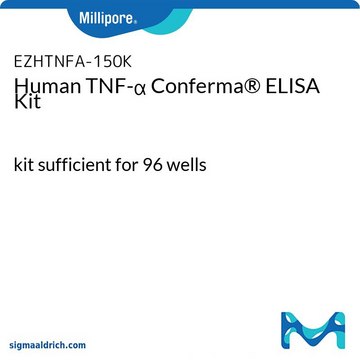11088939001
Roche
Tumor Necrosis Factor-α, human (hTNF-α)
recombinant (yeast)
Synonyme(s) :
hTNF, human necrosis factor
Se connecterpour consulter vos tarifs contractuels et ceux de votre entreprise/organisme
About This Item
Code UNSPSC :
12352207
Produits recommandés
Source biologique
human
Niveau de qualité
Produit recombinant
expressed in yeast
Essai
≥95% (SDS-PAGE)
Forme
solution
Puissance
≤0.01 ng/mL EC50
Activité spécifique
>1*10^8 U/mg
Poids mol.
17,000 Da
Conditionnement
pkg of 1,000,000 U (10 μg, 1ml)
Fabricant/nom de marque
Roche
Conditions de stockage
avoid repeated freeze/thaw cycles
Impuretés
<0.1 EU/μgtested (LAL test)
Numéro d'accès UniProt
Température de stockage
−20°C
Informations sur le gène
human ... TNF(7124)
Description générale
>1 x 10⊥8 U/mg, <0.01 ng/ml (hTNF-a, NIBSC, interim standard, 87/650), at least the same specific activity (EC50) compared to the indicated standard is guaranteed.
Spécificité
Human hTNF-α is effective on human and mouse cells.
Species specificity: human, mouse
Application
Tumor Necrosis Factor-α (hTNF-α)
- Shows cytolytic and/or cytostatic activity on a variety of transformed cell lines.
- Has activating and growth stimulating activities on a variety of normal cells.
- Has antiviral activity on many cell types in vitro.
- Can cause tumor necrosis of certain tumors in vivo.
Actions biochimiques/physiologiques
Receptor p55 and p75, belonging to the TNFR gene family, mediate the biological activity of TNF-a, and are co-expressed on the surface of various cell types. The pleiotropic action of TNF-a is initiated by binding to either of the two receptors.
Qualité
Purity: >95% (SDS-PAGE)
Endotoxin level: <0.1 EU/μg (LAL-test), <10 EU/ml (LAL-test)
Endotoxin level: <0.1 EU/μg (LAL-test), <10 EU/ml (LAL-test)
Séquence
Chain Length 157 AA
One polypeptide chain (157 amino acids), identical to natural hTNF-α.
Définition de l'unité
EC50 definition: The amount of hTNF-α that is required to mediate half-maximal cytotoxicity (MTT cleavage) with WEHI 164 cells in the presence of actinomycin D (1 unit equals ≤0.01 ng/ml).
Forme physique
Solution, filtered through 0.2 μm pore size membrane.
Notes préparatoires
Working concentration: 1 ng/ml
For complete cell lysis of sensitive cell lines about 1 ng/ml is recommended.
Working solution: Dilute the concentrated hTNF-α solution (10 μg/ml) with PBS or culture medium containing BSA (or HSA), 1 mg/ml (0.1%) or serum 1 to 10%.
Storage conditions (working solution): -15 to -25 °C
It is recommended to store the solution in aliquots at -15 to -25 °C.
Note: Avoid repeated freezing and thawing.
For complete cell lysis of sensitive cell lines about 1 ng/ml is recommended.
Working solution: Dilute the concentrated hTNF-α solution (10 μg/ml) with PBS or culture medium containing BSA (or HSA), 1 mg/ml (0.1%) or serum 1 to 10%.
Storage conditions (working solution): -15 to -25 °C
It is recommended to store the solution in aliquots at -15 to -25 °C.
Note: Avoid repeated freezing and thawing.
Autres remarques
For life science research only. Not for use in diagnostic procedures. 1 EU corresponds to 0.1 ng
Code de la classe de stockage
12 - Non Combustible Liquids
Classe de danger pour l'eau (WGK)
nwg
Point d'éclair (°F)
does not flash
Point d'éclair (°C)
does not flash
Faites votre choix parmi les versions les plus récentes :
Déjà en possession de ce produit ?
Retrouvez la documentation relative aux produits que vous avez récemment achetés dans la Bibliothèque de documents.
P De Cesaris et al.
The Journal of biological chemistry, 274(41), 28978-28982 (1999-10-03)
Tumor necrosis factor alpha (TNF-alpha) is a cytokine implicated in the pathogenesis of numerous chronic and acute inflammatory conditions. We have previously shown that mouse Sertoli cells respond to TNF-alpha by increasing interleukin-6 production and intercellular adhesion molecule-1 (ICAM-1) expression
Rajitha Indukuri et al.
Frontiers in endocrinology, 12, 650625-650625 (2021-04-17)
Inflammation is a primary component of both initiation and promotion of colorectal cancer (CRC). Cytokines secreted by macrophages, including tumor necrosis factor alpha (TNFα), activates the pro-survival transcription factor complex NFκB. The precise mechanism of NFκB in CRC is not
Notre équipe de scientifiques dispose d'une expérience dans tous les secteurs de la recherche, notamment en sciences de la vie, science des matériaux, synthèse chimique, chromatographie, analyse et dans de nombreux autres domaines..
Contacter notre Service technique







